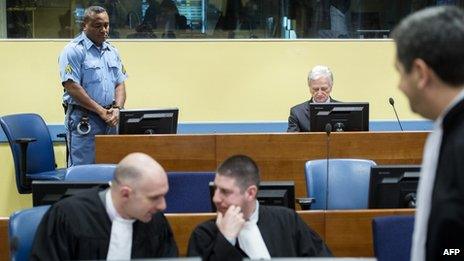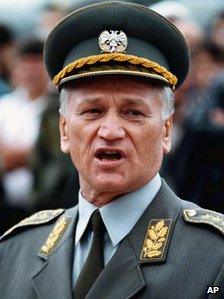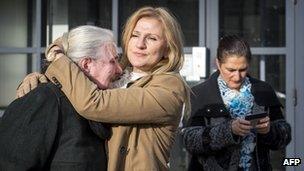Momcilo Perisic Hague acquittal leaves little sense of justice
- Published

Momcilo Perisic's acquittal may improve the image of the Hague tribunal in the eyes of many Serbs
It took slightly longer than half a football match for the appeal chamber to announce its decision.
The result had begun to seem beyond doubt as judge Theodor Meron analysed the failings of his colleagues in The Hague tribunal's trial chamber - but there was still drama and tension.
Finally, in the equivalent of stoppage time, he confirmed what one news agency called "a rare victory for Serbs" at the International Criminal Tribunal for the former Yugoslavia (ICTY).
Momcilo Perisic, the man who led Yugoslavia's army in the mid-1990s, would be acquitted on all charges and released.
His convictions - for aiding and abetting crimes against humanity in Sarajevo and Srebrenica - and his 27-year prison sentence were overturned.
The former general responded with nothing more than a twitch of his left eye. But his compatriots may feel entitled to be somewhat less restrained.
Victor's justice
Recent verdicts at the ICTY have left many Serbs with the impression that the tribunal delivers nothing more than victor's justice - jailing Serb defendants while allowing crimes against Serbs to go unpunished.

Momcilo Perisic commanded Yugoslavia's armed forces in the 1990s
Just three months ago the same appeal chamber, chaired by the same judge, sparked outrage in Serbia when it quashed the conviction of two Croatian generals, Ante Gotovina and Mladen Markac.
They had previously been found guilty of deliberately targeting civilians during the offensive known as Operation Storm in 1995.
Hundreds of thousands of ethnic Serbs fled Croatia en masse. Many are still without permanent homes or jobs and have been unable to recover the property they left behind.
The appeal chamber's verdict left them without justice as no-one else has been convicted of crimes against Croatia's Serb minority.
The retrial of Kosovo's former Prime Minister, Ramush Haradinaj, brought another acquittal last November.
With a prosecution case riddled with holes, the verdict came as no surprise. But it left Kosovo Serbs in a similar position to their Croatian counterparts.
Just two weeks later, the ICTY found a Bosnian Serb commander, Zdravko Tolimir, guilty of genocide for his part in the Srebrenica massacre of 1995.
Restored faith?
This was justice for the thousands of victims, but coming so soon after the other two verdicts it reinforced the feeling among many Serbs that the tribunal was weighted against them.
But the Perisic verdict may help to restore faith in the neutrality of the special court. Serbian human rights activist Natasa Kandic told the BBC that it was an important judgement for all Serbs.

Many relatives of the victims of the Balkans wars are still waiting for justice
"They will see the ICTY is not just trying to prove that Serbs are criminals. They will say the ICTY has proved that Serbia does not have state responsibility for the atrocities in Sarajevo and Srebrenica," she said.
But Ms Kandic still has concerns about the way in which the verdict was presented.
"The judgement didn't mention the victims. We need additional instruments to gain justice for the victims. This judgement doesn't mention them - 8,000 dead people - where is the justice for them?"
Campaigners like Ms Kandic see this as the real failing of the ICTY. For all its aims of providing international-standard justice to the people of the former Yugoslavia, it has provided precious little in the way of reconciliation.
From a Serbian point of view, the Perisic verdict adds credibility to the tribunal's other decisions, which have put many ethnic Serbs in jail. But long-term reconciliation in the region may require more than just a judicial process.
- Published28 February 2013
- Published28 February 2013
- Published30 October 2012
- Published6 September 2011